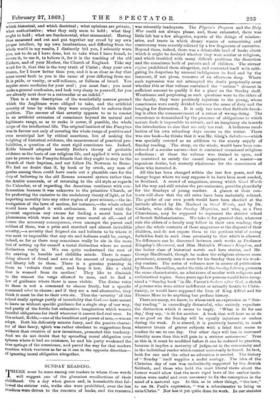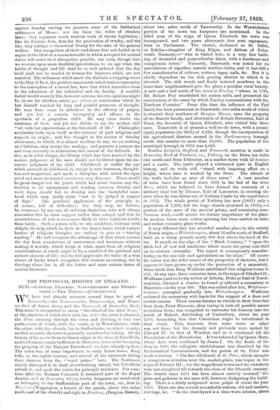SUNDAY READING.
THERE must be some among our readers to whom these words will suggest one of the gloomiest recollections of their childhood. On a day when games and, in households that followed the stricter rule, walks also were prohibited, even the less studious were driven to the resource of books, and the resource was miserably inadequate. The Pilgrim's Progress and the Holy War could not always please, and, these exhausted, there was
little left but a few allegories, reports of the doings of missionaries, and tracts in which dreary wastes of sermonizing and controversy were scantily relieved by a few fragments of narrative. Beyond these, indeed, there was a debateable land of books about which it might be doubted whether they were secular or religious,
and which troubled with many difficult problems the discretion and the conscience both of parents and of children. The sterner regime prohibited them altogether, and contented itself with mitigating its despotism by unusual indulgences in food and by the innocent, if not pious, resource of an afternoon sleep. Where such repression was not attempted the doubt perpetually arose whether this or that volume contained the "serious" element in sufficient amount to qualify it for a place ou the Sunday shelf. Wearisome and perplexing as such questions were to the elders of the family, they were positively injurious to the young, whose consciences were sorely divided between the sense of duty and the longing for distraction. It is only too true that Sabbath-breaking is often the commencement of a career of wrong-doing. The conscience is demoralized by the presence of obligations to which nature finds it impossible to submit, and an imaginary sin is made the introduction to sins that are only too real. A ludicrous recollection of his own schoolboy days occurs to the writer. There was one book—he thinks that it was Mr. Gleig's Subaltern—which was specially coveted as an addition to the scanty supply of Sunday reading. The story, on the whole, would have been considered of a secular nature—but it contained occasional religious reflections ; at these the volume was trained to open, and so contrived to satisfy the casual inspection of a master—an ingenious device, but scarcely wholesome for the consciences of those who invented it.
All this has been changed within the last few years, and the change began where we may suppose it to have been most needed, in Scotland. A crowd of magazines, among which Good Words led the way and still retains the pre-eminence, provides plentifully for the Sundays of young readers. A glance at their contents will show that the old rules have been materially relaxed. The guides of our own youth would have been shocked at the latitude allowed by Dr. Macleod in Good Words, and by Dr. Guthrie, who edits the Sunday Maga:ine, and who, as a Free Churchman, may be supposed to represent the stricter school of Scotch Sabbatarianism. We take it for granted that, whatever rule the elders of a family may follow in their own reading, they place the whole contents of these magazines at the disposal of their children, and do not expose them to the perilous trial of seeing forbidden fruit in such close proximity to that which is allowed. No difference can be discerned between such works as Professor Kingsley's Ilereward, and Miss Muloch's Woman's Kingdom, and the better class of historical novels and love stories, and Mr. George MacDonald, though he makes the religious element more prominent, scarcely uses it more for his Sunday than for his weekday readers. The series of volumes now in course of publication by Messrs. Macmillan, under the title of the Sunday Library, presents the same characteristic, an admixture of secular with religious and ecclesiastical topics. Some years ago few persons would have recognized a "Sunday book "in Mr. Farrar's Seekers after Gull, a sketch of persons who were either indifferent or actually hostile to Christianity, or would have supposed the lives of King Alfred and Sir Thomas More to be anything but profane history.
There are many, we know, to whom such an expression as " Sunday reading" is exceedingly distasteful, who entirely repudiate the distinction which it seems to imply. ' What is fit for one day,' they say, is fit for another. A book that will hurt us or do us no good on the Sunday will be equally injurious or useless during the week. It is absurd, it is positively harmful, to mark whatever treats of graver subjects with a label that seems to confine its use to one day. Our other days will lose in increased frivolity more than this will gain in a stricter seriousimess."frue as this is, it must be modified before it can be reduced to practice, because it implies a maturity of judgment in the community and in the individual reader which cannot universally be found. In fact, both for one and the other an education is needed. Time history of " Sunday " itself supplies a useful analogy. The idea of the Christian day of rest was undoubtedly suggested by the Jewish Sabbath, and those who hold the most liberal views about the former would allow that the more rigid laws of the earlier institution were useful and even necessary to fix the conception in the mind of a material age. In this, as in other things, " the law," to use St. Paul's expression, " was a schoolmaster to bring us unto Christ." Nor has it yet quite done its work. In our statutes against Sunday trading we preserve some of the Sabbatical ordinances of Moses ; nor are these the relics of obsolete laws ; they represent much anxious work of recent legislation ; like the Factory Acts, Acts for the prevention of cruelty, and the like, they infringe a theoretical liberty for the sake of the general welfare. Our recognition of their usefulness does not forbid us to aspire to the ideal of a commonwealth in which a respect for mutual duties will make their abrogation possible, nor even, though here we venture upon more doubtful speculations, to an age when the habits of thought and life shall be so well ordered that the day itself shall not be needed to witness for interests which are not material. The ordinance which made the Sabbath a stepping-stone to the Day of Rest, the positive enactments which train a community to the conception of a moral law, have that which resembles them in the education of the individual and the family. A sensible father would scarcely like, however extreme his own opinions might be, to see his children arrive per sallum at conclusions which he has himself reached by long and painful processes of thought. He may have come to disbelieve in the efficacy of prayer, and yet feel a certain incongruity and offence in the spectacle of a prayerless child. He may even doubt the existence of God, and yet not dislike to see the mother still "sit with her superstitions at the threshold of life." Philosophic secularism looks upon itself as the outcome of past religions and respects its origin ; and free thought in the matter of Sunday observance, in which, it is almost needless to say, we see nothing un-Christian, may accept the analogy, and perceive a present use and even necessity in restrictions that savour of the Sabbath. In this, as in other things, the liberty which has been reached by the mature judgment of the man should not be thrust upon the immature judgment of the child. Childhood, or rather the age which succeeds to childhood, is, except in rare instances, thoughtless and unspiritual, and needs a discipline with which the riper mind and more instructed conscience may dispense. There would be great danger lest the youth which had never known any distinction in its amusements and reading between Sunday and week days, should fail to develop into the thoughtful manhood which may justly claim "not to be judged in respect of days." The practical application of the principle is, of course, full of difficulties ; but they may, we believe, be overcome by any one of ordinary discretion, who will always remember that he must suggest rather than compel, and that an overstrictness of rule is even more likely to have injurious results than laxity. Such a person will, we are confident, welcome with delight the help which he finds in the larger limits which various leaders of religious thoughts are uniting to give to "Sunday reading." He will recognize the advantage of that which rescues the day from associations of narrowness and weariness without making it worldly, which keeps it what, apart from all religious considerations, it surely ought to be, a symbol of the spiritual and earnest element of life ; and he will appreciate the value of a wise choice of books which recognizes this element as existing, not in theology alone, but in all the better and more serious forms of secular literature.



































 Previous page
Previous page